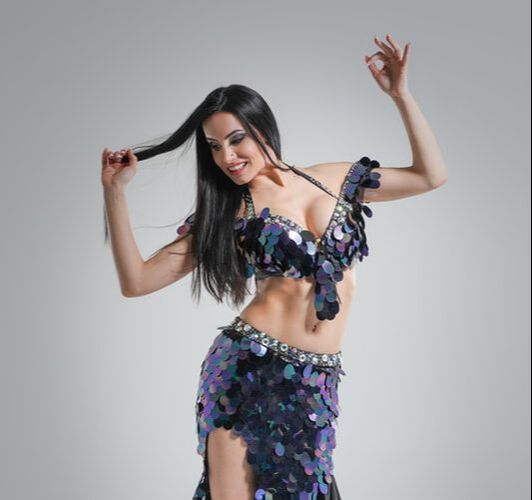|
Learn About this Iconic Song and the Singer Who Bridged the Gap Between Middle Eastern & North African Cultures What belly dancer doesn't love Esmaouni? If you've never heard this song before, today you are in for a treat! And if you are already familiar with it, you are in for a full-on feast, as we're about to take a deep dive into the background, translation and meaning of this beautiful, timeless classic. So keep on reading, and next time you dance to Esmaouni, notice how it takes on a whole new level depth and meaning for you! About Esmaouni Esmaouni (اسمعوني, alternatively spelled Ismaouni, Esma3ouni, or Isma3ouni) is a classic Arabic song that was released in 1974. It was famously sung by one of the biggest stars of Egyptian music, Warda Al-Jazairia, written by lyricist Sayed Morsi and composed by Warda's husband and popular composer Baligh Hamdi. Its title means "Listen to Me." The Warda 1974 original was over 20 minutes long, and today there are countless shorter, modern renditions of it by other famous Arab singers and musicians, both with and without vocals.  The Rose of Algeria Although Warda (1939? - 2012) is now known as an icon of Egyptian music, she was actually not Egyptian at all. Throughout her life she lived in many countries: France, Lebanon, Algeria, and Egypt--where she married Baligh Hamdi and built her ultimate stardom. In Egypt, Warda performed with some of the most famous Arab musicians of her time, eventually becoming one herself, and she even acted in several movies. Having been born in France to Lebanese and Algerian parents, Warda did not speak in the Egyptian dialect for much of her younger life, nor was she able to write in Arabic. It was thanks to her demanding mentor--the prominent Egyptian singer/composer Mohammed Abdel Wahab--that Warda learned to sing with an Egyptian accent and write in Arabic script! Warda's singing "plays on a specific emotional range successfully combining strength and frailty: on the one side will-power, self-assertion, even challenge; on the other side sweetness and a tenderness implying some kind of vulnerability," as beautifully stated by Daniel Caux, a lecturer of Arabic music at the University of Vincennes. This is why so many are infatuated by her music. She also bridged the linguistic and musical gaps between various Arab countries, making her a truly pan-Arabic icon of her time, which she remains to this date. She sang patriotic Algerian songs during the time of Algeria's fight for independence, she sang songs honoring Lebanon, Egypt and Palestine, and could even sing folk songs from the Arab Gulf. Nicknamed The Rose of Algeria, Warda was and still is admired and beloved all over the Arab world, where her voice brings joy to people every day through her classic, timeless songs. Listen to Esmaouni Now are you ready to listen to Warda singing the original 20-minute rendition of Esmaouni ? Here it is... "Listen to Me" - The Meaning When Warda sings Esmaouni, she is telling a story of heartbreak and failed love. You can hear in her voice the pain of having been rendered invisible and insignificant to someone with whom she had once shared a passionate, intimate past. It was a love that had once felt so deep and real. They had meant the world to each other. But now it is as if he "never knew" her, "never met" her, "never saw" her, "never dealt" with her before. Repeatedly pleading "listen to me..." the singer is demanding (to her friends? her community?) to be heard. As she tells her side of the story, she is remembering it again herself; feeling again the emotions she had felt during their romance. The passion, the love, the intimacy... and then the anger and the pain from being rejected in such a dramatic, final and public way. Well, at least that's my interpretation of it! You can judge it for yourself, by listening to the translation below. Esmaouni, Translated So now you get a treat for making it to the end of this post. Watch this video to get an almost word-for-word translation of Esmaouni from Arabic to English. The version used here is a more modern rendition of Esmaouni, by the amazing Egyptian singer Safaa Farid. This video includes the original words in Arabic script, for those of you who can read Arabic--as well as the transliteration into our alphabet, for those who can't--this way we can all sing along! As you're listening to this version, keep in mind that Arabic songs are usually sung using male pronouns, even if the person being sung about is female. This will be the case with this version. Also keep in mind that certain words being used in the lyrics should not be interpreted literally, but instead as euphemisms for feelings or actions that are passionate or intimate. Arabic is a very expressive language with many layers of meaning that are dependent on context. Video by SharqiDance Translation by Ahmed Elswify, International Lighthouse Arabic Academy Music by Safaa Farid. If you love this song, you can listen to the full version here. Was This Post Helpful?I hope this post has been insightful for you, and that it helps you better understand this song so that you can interpret it in an informed and meaningful way. It's hard to truly do justice to classic Arabic music without understanding the words and the stories or meaning behind them!
If you loved this post and would like to see more like it, please hit the "like" button bellow and leave us a comment with your feedback. You can also visit our blog map to find more posts like this, or subscribe to our newsletter, YouTube channel, or Facebook page to be the first to find out about our next post. And if there is a song you love and would like to understand better, or if you want to learn Arabic, you can reach out to International Lighthouse Arabic Academy for translations or online classes (and get 10% off with discount code "sharqidance"). Happy learning, and happy dancing!
8 Comments
1/3/2019 09:57:42 am
Fantastic out standing.
Reply
Archontia Bayati
11/9/2020 03:14:48 pm
I appreciate your text and all of this work so much... being fascinated with a culture and art we are not native to, and trying to develop in it is not easy at all, but you helped a lot... greetings from Greece
Reply
daniela dal sasso
7/12/2021 08:49:30 pm
hi guys, i loved this post, i am used to search for lyrics translation for arabic musics that i like to dance in bellydance, thanks a lot
Reply
Thank you for your comment! I haven't been able to carve out the time to do another translation blog/video again, since I am not an Arabic speaker so I usually work with a source teacher to get the translation, then type up the content and make the video. But if you ever need a source teacher to teach you Arabic or translate something for you, let me know. I have a few recommendations.
Reply
Leave a Reply. |
AuthorYamê is a Brazilian-American View Posts By CategoryIf you'd like to read more articles by Yamê or SharqiDance's guest authors, please view our blog map here.
Archives
January 2024
|


 RSS Feed
RSS Feed